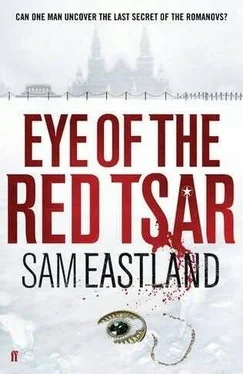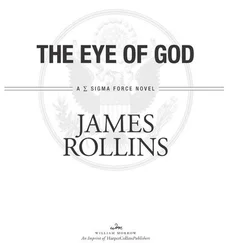“This bone here,” said the man, and snapped his fingers to draw Pekkala’s attention.
Pekkala looked down at his feet. Snowflakes landed on his boots.
The train wheezed impatiently.
A breath of cigarette smoke brushed past his face.
“Answer me, damn you,” said the Guard.
At that, Pekkala had no choice but to raise his head.
The Guard grinned at him. His cigarette had burned so low that the ember almost touched his lips. He held his hand up beside his head, moving his fingers slowly in some mockery of a greeting.
Their eyes met.
When the train pulled out, only Pekkala and one of the women stayed behind. Pekkala was handcuffed to a bench. The Guards dragged the woman into the waiting room beside the station house.
Pekkala heard her screaming.
Half an hour later, the woman ran out naked onto the platform.
By then, the snow had stopped. A full moon shone through passing shreds of cloud. The snow which had fallen no longer melted on Pekkala’s coat. Instead, it collected upon him like a mantle of polar bear fur. He could not feel his hands. The bars of the handcuffs were so cold they seemed to burn his skin. His toes became as hard as bullets hammered into the soft flesh of his feet.
The naked woman reached the platform edge. Her feet skidded in the slush. For one second, she turned and looked at Pekkala.
Twisted into her face was the same expression of terror he had once seen in the eyes of an old horse which had collapsed by the side of the road. The owner had pulled out a long puukko knife and was preparing to cut the animal’s throat. He sat down beside the horse and sharpened the knife on a small whetstone he had set upon his knee. The horse watched him the whole time, its eyes gone hollow with fear.
The woman leaped off the platform and fell heavily onto the rails half a body’s length below. Then she picked herself up and began running away down the tracks in the direction of Helsinki.
The Guards shambled out onto the platform. One was dabbing his fingers against a bloody lip. They looked around, laughing and confused.
“Hey!” A Guard kicked Pekkala’s leg. “Where did she go?”
Before he could answer, the leader of the Guards had spotted her. She was still running. Her naked back shone white as alabaster in the moonlight. Silky puffs of breath rose from her head.
The Guard took out a revolver. It was a 9 mm broomhandle Mauser with a wooden holster which could be converted into a stock, so that the gun could be fired like a rifle. The Guard removed the holster and hooked it up to the butt of the gun. Then he nestled the stock into his shoulder and aimed down the tracks towards the running woman. The gun made a dry snap. A cartridge flipped into the air and skittered across the platform, spinning to a stop next to Pekkala’s boot. A wisp of gun smoke slithered from its mouth.
The other Guards clustered at the platform edge, peering into the dark.
“She’s still running,” one said.
The leader of the Guards aimed again and fired.
The smell of cordite drifted on the frigid air.
“Missed,” said a Guard.
The leader spun around. “Then give me some space!”
The other Guards were not within three paces of the leader, but they jostled back obediently.
Leaning forward, Pekkala could vaguely see the woman still on her feet and running, her body like a candle flame shimmering between the silver rails.
The leader of the Guards aimed again. He fired twice.
The flame which had been the woman seemed to flicker for a second and then it went out.
The leader set the gun stock in the crook of his elbow, the barrel aimed now at the sky.
“Should we go get her?” asked one of the Guards.
“Let her freeze,” replied the leader. “She won’t be there in the morning.”
“Why not?”
“There’s another train coming through before dawn. When that thing hits her, she’ll shatter like a piece of glass.”
The following morning, a Guard placed a black cloth over Pekkala’s head. When the train from Helsinki arrived, he was shoved across the platform, blind and choking for air. Rough hands hauled him on board. He lay in the unheated baggage compartment, handcuffed to a replacement tractor engine, until the train pulled into Petrograd.
“WHAT IF THE ROMANOVS WERE IN THAT TRUCK…” PEKKALA SAID.
Mayakovsky turned in the doorway. “I already told you they were.”
“But what if they were dead when the truck took them away?”
“Listen to me,” said the old man impatiently. “Everybody in this town knew that when those Cheka men arrived in town, the only reason for them being there was to make sure the Romanovs were dead before the Whites marched into town. That’s why they kicked out the local militiamen who had been guarding the Ipatiev house. Moscow wanted to be absolutely sure that if the Whites came close enough, the Cheka would carry out the executions and wouldn’t just run away like the militia might have done. If anybody on the outside wanted the Romanovs killed, all they had to do was wait for the Whites to show up. The only kind of person who would break into that house and risk their life in a gunfight with those Guards was someone who wanted to save the Tsar’s family, not kill them off.”
After Mayakovsky had gone, the three men returned to the table.
“Why did you let him go on talking?” asked Kirov, “when you knew what he was saying was a pack of lies?”
“For once,” said Anton, “I agree with Junior Man here. And the worst part is, the old bastard thinks he got away with it.”
“Mayakovsky didn’t think he was lying,” Pekkala told them. “He’s convinced that the only reason you and the other Cheka guards took over from the militia was so that you could murder the family.”
“We replaced the militia,” replied Anton, “because they were stealing from the Romanovs. The Tsar was being guarded by a gang of petty thieves. It was unprofessional. They could no longer be relied upon for anything.”
“But you see how your arrival must have looked to someone on the outside. That’s why Mayakovsky believed what he was saying. It’s important to know how people have perceived a crime, even if you know it’s not the truth.”
“Either it’s true or it’s not.” Anton picked up the wooden apple and tossed it to Pekkala. “You’re sounding like the men who gave us these.”
“The difference,” said Pekkala, “is that we’re solving a crime, not committing one.”
Anton flung up his hands. “You go ahead and run this investigation however you want. I am going to the tavern to see if I can beg for some tobacco, since that’s the only chance I have of getting any.” He stalked out, slamming the door behind him.
Kirov and Pekkala went to the frigid front room and built a fire. They brought the chairs in from the kitchen and sat in front of the hearth, blankets over their shoulders, and hands held out toward the flames.
From his coat pocket, Pekkala removed the old book he had brought with him. As he read, his expression grew distant. The lines smoothed out in his face.
“What’s that?” Kirov demanded.
“The Kalevala,” murmured Pekkala and kept reading.
“The what?”
Pekkala groaned and set the book down on his knee. “It’s a book of stories,” he explained.
“What sort of stories?”
“Legends.”
“I don’t know any legends.”
“They are like ghost stories. You don’t have to believe them, but it’s hard to think there is no truth in them at all.”
“Do you believe in ghosts, Pekkala?”
“Why are you asking, Kirov?”
“Because I just saw one,” he said.
Pekkala sat up. “What?”
Читать дальше










